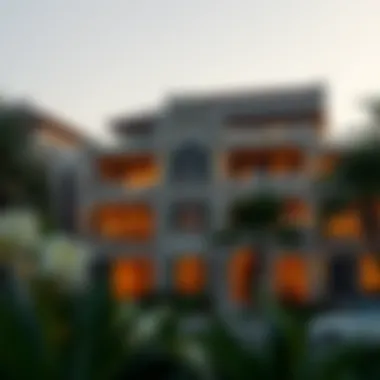Average House Prices in Dubai: A Comprehensive Guide


Intro
In recent years, Dubai has become a focal point for real estate investment, attracting homebuyers and investors from around the globe. The city's unique blend of luxurious living, innovative architecture, and favorable economic conditions makes it a desirable location in the property market. Yet, the question remains—what influences the average price of houses in Dubai?
To unravel this, we will delve into the intricacies of the real estate landscape in the emirate. With diverse neighborhoods offering various living experiences, understanding these dynamics is crucial for making informed decisions. This article aims to provide a thorough examination of market trends, investment opportunities, and the economic factors shaping property values.
As we embark on this exploration, potential buyers, seasoned investors, realtors, and those curious about the market can all gain insights that can fundamentally alter their approach to real estate in Dubai. Let's turn the lens towards market trends and see where the numbers stand.
Overview of Dubai's Real Estate Market
Understanding the real estate landscape in Dubai is paramount for anyone looking to navigate the complex property market. This section serves as a compass, providing insight into the current dynamics of real estate in this rapidly evolving emirate. Analyzing the varying market conditions and historical price trends not only informs potential buyers but also assists investors and real estate professionals in making educated decisions.
Current Market Conditions
Right now, the Dubai real estate market is a bit of a mixed bag. On one hand, property prices have seen noticeable fluctuations, with some areas experiencing a surge while others stagnate. This volatility can be attributed to various factors.
For example, the influx of foreign investment has been robust, driven by recent government initiatives aimed at attracting expatriates. Areas like Downtown Dubai and Dubai Marina are bustling due to their luxury offerings. Meanwhile, more affordable neighborhoods, such as Dubai South, are picking up momentum as demand grows for budget-conscious living options.
In recent months, the market has also been buoyed by a rebound in tourism, strengthening the rental and purchase market. Higher demand often means that buyers might need to act fast, lest they watch ideal properties slip through their fingers. Key indicators like average days on the market and average selling prices can provide insights into these shifting conditions.
Moreover, adapting to current market trends requires a keen eye on economic signals, which can sway buyer sentiment. In this climate, understanding zoning rules and property laws is essential. Buyers are advised to keep up with market reports and consult reputable real estate firms to identify opportunities and pitfalls.
Historical Price Trends
Looking back at the historical price trends in Dubai paints a clearer picture of the market's volatility and resilience. Over the past decade, property values have gone through distinct cycles that reflect broader economic shifts.
After the 2008 financial crisis, for instance, prices plummeted. However, a steady recovery followed, marked by rebounds in both the luxury segment and mid-range properties. Notably, 2020 brought its own set of challenges with the onset of the pandemic, creating a temporary dip in transactions and prices. Interestingly, as restrictions began to ease, the market saw a resurgence, especially in the latter half of 2021 and into 2022.
In addition, many analysts point to seasons of rapid growth, particularly tied to events like Expo 2020. This world fair attracted global interest and provided a significant boost to the real estate sector. A consistent trend represents the annual price changes, typically increasing in spring and fall when buyers are most active. For those looking at long-term investments, understanding these ups and downs can prove beneficial in devising effective strategies.
"Dubai's real estate market embodies both opportunities and risks; grasping its trends is crucial for smart investment decisions."
The accumulated knowledge of historical price trends, tied in with current market conditions, clearly outlines the importance of traditional data analysis in making informed choices in Dubai's competitive landscape.
Overall, comprehending Dubai's real estate market isn’t just an exercise in number-crunching; it’s about grasping the underlying forces that shape the desire to invest in one of the world's most iconic cities.
For further insights and details, you may refer to Dubai Land Department and broader economic discussions on Wikipedia.
Factors Influencing Property Prices
Understanding the conditions impacting property prices in Dubai is essential for buyers looking to make informed decisions. The property market here isn’t a static entity; it shifts and evolves influenced by several factors. These include economic indicators, governmental policies, and ongoing infrastructure developments.
To navigate the complexities of pricing in Dubai’s real estate landscape, one must consider how these variables interact. As a potential buyer or investor, grasping how each factor can drive prices up or down will firmly place you ahead in the game and help you avoid common pitfalls.
Economic Indicators
Economic indicators are like the flashing lights of a dashboard; they show the health of the economy and, by extension, the property market.
Inflation Rates
Inflation rates are crucial in evaluating property prices. When inflation rises, purchasing power often decreases, meaning any fixed salary can buy less. This can lead to a surge in property prices, as sellers adjust to ensure their earnings keep pace with inflation. The key characteristic here is that inflation isn’t just a number—it’s a signal. It indicates whether it’s a good time to buy or sell.
On the flip side, high inflation may deter potential buyers due to the intimidating prospect of escalating prices. For investors, inflation can act as a double-edged sword.
- Advantages: Properties can serve as a hedge against inflation; as prices rise, so too do rental yields.
- Disadvantages: Rising costs can lead to reduced buyer confidence, which may ultimately deflate the market.
Employment Rates
Another significant driver is employment rates, which reflect a region’s economic stability. A high employment rate generally means more people have disposable income, which can boost demand for housing. This demand pushes prices up, making the property market more competitive.
A noteworthy aspect of this parameter is its effect on potential buyers’ confidence levels. When employment is stable, people tend to invest in properties, believing their job security is strong. But, when employment rates drop, it can cause a ripple effect.
- Advantages: Robust employment can lead to a more vibrant housing market.
- Disadvantages: In times of layoffs or recessions, the market can face severe downturns.
Government Policies
Government policies can shape the property landscape dramatically. Regulatory changes can either stimulate growth or deter investors altogether.
Tax Regulations
Tax regulations are pivotal as they determine the cost of property ownership. Favorable tax policies can make Dubai an appealing option for expats and investors. Low property taxes often attract buyers hoping to capitalize on the lucrative rental market. The key characteristic of tax regulations is how they can change with little notice, impacting long-term investment strategies.


- Advantages: A conducive tax environment can encourage foreign investments and contribute to housing demand.
- Disadvantages: Sudden changes in tax policies can catch buyers off guard.
Foreign Investment Laws
Foreign investment laws dictate how easily non-residents can buy property. Restrictions can deter potential buyers, slowing overall market growth. Conversely, easing these laws often stimulates both demand and competition. A notable feature of these laws is how they can vary from year to year, based on the government’s economic strategy.
- Advantages: Attractive foreign investment laws can boost property prices through increased demand.
- Disadvantages: Stricter regulations can lead to reduced foreign participation, impacting price levels.
Infrastructure Development
Infrastructure is the backbone of any city’s growth. Improved transportation or community facilities can elevate property values significantly.
Transportation Projects
Transportation projects, like new metro lines or major highways, directly affect property prices. Areas that see enhancements in connectivity often experience skyrocketing property values. It’s simple—better access means more interest and higher demand.
- Advantages: Increased accessibility can draw more buyers and investors, pushing prices higher.
- Disadvantages: Ongoing construction can initially deter potential buyers.
Community Amenities
Community amenities add a layer of attraction to any neighborhood. Parks, shopping centers, and schools can be game-changers in property valuations. They enhance the living experience, making regions that boast such features highly sought after.
- Advantages: Amenities can justify higher property prices, as buyers often weigh convenience highly.
- Disadvantages: If overdeveloped, the charm of an area can vanish, making it less appealing.
These factors interact and create a network of influence that dictates property prices in Dubai. By understanding them, potential buyers and investors can make sound choices that align with their financial goals.
Neighborhood Price Variations
When looking at the housing market in Dubai, it is crucial to understand how neighborhood price variations play a significant role in influencing the overall average price of houses. The costs of properties can differ dramatically based on the location, amenities available, and the allure of the community itself. Investors and homebuyers should pay attention to these variations as they represent both opportunities and risks.
In essence, neighborhood price variations provide valuable insights into where to buy, what type of properties fit into one's budget, and which areas might see growth in the future. It's not just about finding a house; it’s about finding a home in an area that resonates with your lifestyle and investment goals.
Luxury Areas and Their Premiums
Downtown Dubai
Downtown Dubai stands tall as a prime example of luxury real estate in the emirate. Characterized by its stunning skyline, which includes the world’s tallest building, the Burj Khalifa, this area offers an unparalleled urban living experience. One of its key characteristics is accessibility; residents can easily access high-end shopping venues, fine dining, and a vibrant nightlife.
The unique feature of Downtown Dubai is its mixed-use environment, blending residential, commercial, and leisure spaces seamlessly. This combination makes it a sought-after spot for both investors and individuals looking for an upscale lifestyle. Its advantages, however, come with disadvantages as well; property prices here can be sky-high, potentially limiting affordable options for first-time homebuyers. The stability in property values typically draws in serious investors but may not be ideal for those seeking lower-cost or more diverse real estate options.
Dubai Marina
Another luxurious staple, Dubai Marina offers a blend of opulence and scenic views. Marked by its beautiful waterfront and yacht club, this area feeds into the appeal of relaxed coastal living combined with the intense hustle of city life. The key characteristic of Dubai Marina is its resort-style amenities, such as pools, jogging tracks, and proximity to beaches.
The unique feature here is the extensive range of high-rise buildings, many of which offer panoramic views of the Arabian Gulf. This aspect undoubtedly attracts affluent buyers, with property prices reflecting this demand. However, the area’s increasing population density might lead to issues such as noise and traffic congestion, which could deter some potential residents.
Emerging Neighborhoods
Dubai South
Dubai South is rapidly making a name for itself as a hotbed of investment potential. Strategically positioned near the Al Maktoum International Airport and the Expo 2020 site, this area is designed to become a major hub for commerce and living. Its key characteristic is affordability, especially when compared to established areas in Dubai.
The unique feature of Dubai South revolves around its future-oriented planning, with significant developments in residential and commercial spaces underway. This neighborhood offers a range of options for both buyers and renters looking for reasonably priced properties. On the flip side, being relatively new, it may lack some of the immediate amenities and established community elements found in more mature neighborhoods.
Jumeirah Village Circle
Another emerging star, Jumeirah Village Circle (JVC), has rapidly gained traction among young families and professionals alike. This area is known for its community-oriented design, featuring parks, schools, and retail options that cater to everyday needs.
The unique feature of JVC is its affordability juxtaposed with a family-friendly atmosphere. Compared to more established regions, property prices tend to be lower, attracting many buyers who desire value without sacrificing quality of life. However, its growth means that construction and development may still pose temporary inconveniences, like noise or limited access during certain times.
Established Areas
Al Ain Road
Al Ain Road offers a blend of mid-range and high-end properties, catering to a diverse demographic. It's known historically for being a well-connected thoroughfare leading into the city, making it both practical and desirable. The key characteristic here is its value for money, with properties often being more affordable than in luxury areas.
The unique feature of Al Ain Road is its relatively larger plots and spacious homes compared to more urban settings. This provides families ample space to grow, but as the area becomes more desirable, prices may increase, complicating future affordability.
Deira
Deira brings an old-world charm mixed with modern living and is often considered one of Dubai’s most established neighborhoods. It is synonymous with heritage, featuring local markets and cultural landmarks that reflect the city’s history. The key characteristic of Deira is its vibrant community and historical significance.
As one of the longest-standing areas in Dubai, Deira's unique features include its traditional souks offering everything from spices to gold, making it attractive for those valuing cultural authenticity. However, its aging infrastructure and the potential for noise could deter some buyers.


Overall, understanding neighborhood price variations is essential for making educated decisions in Dubai's layered real estate landscape. Each neighborhood has its unique sets of opportunities, benefits, and potential drawbacks, which can heavily impact your real estate journey.
Average House Prices in Dubai
Understanding average house prices in Dubai is crucial for potential homebuyers and investors alike. With its booming real estate market, the emirate offers a wealth of opportunities, but also presents complexities that require careful navigation. By comprehending average house prices, one can assess the financial viability of investments, set budgets, and understand market dynamics in the wider context of UAE's economic landscape. This section unpacks the different types of properties available and illustrates the variations in pricing across neighborhoods, which is essential knowledge for anyone looking to make informed decisions in their property search.
Average Prices by Type of Property
Apartments
Apartments are a popular choice for many buyers in Dubai due to their accessibility and variety. These units are known for their relatively affordable pricing compared to villas, making them an attractive option for first-time homeowners or investors looking for rental opportunities. The key characteristic of apartments is their diverse range of options—from studio units to lavish penthouses.
The unique feature of apartments is the ability to provide amenities such as swimming pools, gyms, and security services, which are appealing to modern lifestyles. However, buyers should consider factors like maintenance fees and potential restrictions on pets or renovations, which can impact overall satisfaction.
Villas
Villas represent a higher tier of living in Dubai, catering to families looking for spacious homes in serene surroundings. The special aspect of villas is their substantial space, often featuring gardens and private pools, which enhances comfort and privacy. The allure of a villa lies in its luxurious lifestyle and the ability to host gatherings in larger family spaces.
Buying a villa often comes with higher price tags due to their features and the convenience of living in premium neighborhoods. Nevertheless, prospective buyers must weigh the benefits against the potential for upkeeping and maintenance, which can require a significant investment of time and resources.
Townhouses
Townhouses occupy a midpoint between apartments and villas, offering both affordability and spaciousness, typically in community settings. A prominent feature of townhouses is their two or three levels, providing a distinctive layout compared to standard apartments. This style often appeals to young families or individuals seeking more room without the high costs associated with larger homes.
The benefits of townhouses include a balance of community living—most come with shared amenities—but they also carry the risk of neighborhood regulations that dictate exterior modifications or landscaping. Buyers are encouraged to familiarize themselves with these community guidelines before committing.
Price Ranges Across Different Areas
Price variations across neighborhoods in Dubai reflect the city’s diverse real estate landscape. High-demand areas like Downtown Dubai and Dubai Marina command steep prices, often appealing to affluent buyers and luxury renters. In contrast, emerging neighborhoods like Dubai South and Jumeirah Village Circle offer more competitive pricing, drawing in those seeking affordability without sacrificing quality of life.
"Each neighborhood has its own flavor, so do your homework before jumping in."
This section guides potential buyers through the intricacies of local pricing, emphasizing the need for thorough research to find properties that best fit their financial capabilities and lifestyle preferences.
Purchasing vs. Renting: A Price Comparison
When it comes to finding a place to call home in Dubai, the debate between purchasing property or renting is as nuanced as a fine tapestry. For potential buyers looking to invest or renters searching for comfort, understanding the pros and cons can be key to navigating this complex landscape.
Pros and Cons of Buying
Buying a home in Dubai can come with a myriad of advantages. First, ownership means you can customize your living space without needing to seek permission from a landlord. It's your canvas to paint, whether you want to renovate the kitchen or put up that quirky wallpaper you adore.
However, potential buyers should be mindful of hefty upfront costs, which include down payments, property registration, and possible renovation expenses. Over time, these financial commitments can add up. Additionally, there’s the potential risk connected with property value fluctuations. Although property values in Dubai have generally appreciated, economic storms can still sway prices unexpectedly.
Here are some key points to consider:
- Equity Building: As you pay off your mortgage, you build equity; this could serve as a financial springboard in the future.
- Stability: Homeownership often brings long-term stability and a sense of belonging, especially in a culturally rich city like Dubai.
- Investment Potential: Given Dubai's steady growth and attractiveness to expats, there can be a good return on investment if the market continues to be robust.
Nonetheless, challenges include:
- Costs of Upkeep: Homeownership also requires a budget for maintenance, repairs, and perhaps unexpected surprises down the line.
- Market Risks: As mentioned, economic shifts can influence property prices; thus, it's vital to keep an eye on market indicators.
Pros and Cons of Renting
On the flip side, renting might appeal more to those not ready to sink down roots or who prefer flexibility in their living arrangements. This setup tends to require less initial capital; you only typically need to pay the first month's rent and a security deposit. Additionally, if something goes awry—like a leaky roof or a faulty stove—it's generally up to the landlord to take care of repairs.
However, renters won’t be building equity. Their monthly payments go into someone else's account, with no investment to speak of at the end of the day.
Renting has its own set of advantages:
- Flexibility: Ideal for those whose careers might move them around; it offers the freedom to relocate without the long-term commitment of a mortgage.
- Lower Financial Risk: You’re less exposed to market volatility since rental contracts are typically for much shorter periods.
- No Maintenance Woes: As a renter, maintenance responsibility often lies with the landlord, allowing you to enjoy your home without worrying about unforeseen repair costs.
Still, there are some downsides:
- No Equity Accumulation: At the end of a lease, you won’t have anything to show for your rent payments, aside from a few memories.
- Rent Increases: Annual rent spikes can be a reality, especially in a demand-driven market like Dubai. Thus, budgeting can be tricky when rents rise.
Ultimately, the decision between purchasing and renting comes down to individual circumstances, financial stability, and long-term plans. Investors looking for the long haul may lean toward property ownership, while those who value flexibility and lower up-front costs might find renting more appealing.
"In the end, choosing between buying and renting in Dubai isn’t just a financial decision; it’s about what fits your lifestyle best."
Having a clear understanding of these elements can greatly assist would-be buyers and renters in making informed decisions that align with their goals and circumstances.


The Role of Real Estate Agents
In the intricate and often chaotic world of Dubai’s real estate, a proficient real estate agent can serve as your north star. Their expertise is crucial for both buyers and sellers navigating this dynamic landscape. Given the competitive market, understanding the role and significance of real estate agents can make a hefty difference in your property pursuits.
Real estate agents in Dubai not only facilitate transactions but also provide expert guidance on market conditions, neighborhood characteristics, and relevant legalities. For potential buyers, having a knowledgeable agent means you’re equipped with insights that influence purchase decisions. From identifying emerging neighborhoods to understanding when to act, their input can prevent costly missteps.
Selecting a Qualified Agent
Choosing the right agent can feel like hunting for a needle in a haystack, but it doesn’t have to be overwhelming. First and foremost, consider experience. An agent well-versed in Dubai’s real estate trends, especially one with a solid track record in similar property types, is invaluable.
- Referrals and Recommendations: Ask friends or colleagues for suggestions. Referrals often lead to reliable agents who have proven their worth.
- Online Research: Review platforms such as Zillow or Realtor.com for agent profiles and client reviews. Aim for agents with positive feedback and extensive listings.
- Interview Prospective Agents: Don't hesitate to ask them probing questions about their recent transactions, local market knowledge, and how they plan to meet your needs.
A top-notch agent should not only be approachable but also a shrewd negotiator with a keen understanding of pricing strategies.
Understanding Fees and Commissions
Before signing any dotted lines, it’s crucial to demystify the often-misunderstood realm of real estate commissions. Generally, agents in Dubai charge around 2% to 3% of the property’s sale price, but it's a good practice to clarify this upfront.
Here are several aspects to keep in mind:
- Commission Rates Vary: Depending on the property's location and type, commission fees can differ. Higher-end properties might incur different rates compared to more affordable options.
- Split Commissions: Often, the total commission is split between the buyer's and seller's agents. Ensure you understand how this division might impact the negotiation.
- Extras for Services: Some agents might offer additional services, like staging or marketing support, which could affect their commission structure. Make sure you know what’s included in their fee.
"Understanding the costs associated with hiring a real estate agent is the first step in making informed decisions in your property journey."
In summary, the role of a real estate agent in Dubai is pivotal. They not only ease the buying or selling process, but their insights into market nuances can help buyers make choices that align with their goals. Always approach the engagement with clarity regarding fees and services to create a win-win situation.
Future Trends in Dubai's Housing Market
The future of Dubai's housing market is a crucial consideration for investors, homebuyers, and real estate professionals alike. With a landscape that is constantly evolving, understanding upcoming trends can help stakeholders not just to keep pace but to make informed decisions. This overview delves into anticipated price movements and investment opportunities poised to shape the market.
Forecasting Price Movements
Predicting the trajectory of property prices in Dubai involves a blend of economic indicators and market dynamics. Many experts keep an eye on interest rates, demand-supply ratios, and macroeconomic factors like oil prices and tourism levels.
- Interest Rates: Changes in interest rates can significantly impact borrowing costs. When rates rise, potential buyers might hold back from purchasing. Conversely, low rates can spur demand, driving prices upward.
- Demand and Supply: The balance between new developments and existing property sustainably influences pricing. If new housing projects outstrip the demand, one could expect a stabilization or even a decline in prices.
- Economic Sentiment: Local and global economic health plays a crucial role. A vibrant economy tends to fuel consumer confidence, leading to increased property investments. Conversely, a downturn can lead to stagnation.
"Understanding the economic pulse of Dubai is essential for predicting price trends in its housing market."
Leveraging tools such as real estate market reports and platforms like Statista can provide valuable data for making predictions about future price movements.
Investment Opportunities on the Horizon
As the market evolves, Dubai presents various promising investment opportunities. Here are some areas to watch:
- Sustainable Developments: With a global focus on sustainability, properties that align with eco-friendly standards are gaining traction. Developments that minimize environmental impact are likely to command higher prices.
- Technologically Enhanced Homes: Smart homes are not just a fad. Increasingly, investors are looking for properties equipped with the latest technology, adding convenience and potential resale value.
- Affordable Housing Initiatives: The government is placing emphasis on affordable housing, aiming to attract a larger pool of buyers and renters. Investment in these projects can lead to significant long-term benefits.
- Tourism-Centric Properties: With Dubai's consistent growth in tourism, there’s an ongoing demand for short-term rental properties. Areas near major attractions or events are particularly appealing.
Homebuyers and investors should keep a keen eye on these emerging trends and align their strategies accordingly. Collaborating with local real estate experts can provide an edge, ensuring the right investments are made at the right time.
Further insights can be gathered from reputable resources like Dubai Land Department or recent studies published in JLL. This will help navigate the complex terrain of future property valuations in Dubai.
End: Making Informed Decisions
Navigating the landscape of Dubai's real estate market can be akin to finding a needle in a haystack. With the ebb and flow of property prices, it's vital for buyers, investors, and even renters to make choices grounded in thorough understanding. This article has taken a closer look at average house prices, trends, and influences affecting this dynamic market, but it’s the thoughtful decision-making that will translate this knowledge into successful investment or rental outcomes.
When considering options within Dubai's housing sector, several factors must weigh heavily in your decision-making process:
- Understanding Your Budget: Knowing what you can comfortably afford is crucial. This goes beyond just the price of the property; include maintenance fees, utility costs, and possible renovation expenditures.
- Assessing Location Preferences: Different areas offer unique advantages. For instance, the luxurious Downtown Dubai might be appealing, but emerging neighborhoods could offer better value for money with growing amenities.
- Identifying Future Potential: Think long-term. Areas undergoing significant development, like Dubai South, might offer properties at a lower price point now, but their potential for appreciation could make them a golden ticket down the line.
"It’s not always about buying at the top of the market; smart buyers know how to spot a diamond in the rough."
In essence, every potential decision boils down to informed choices. Having analyzed the factors, taken note of the pricing trends, and explored neighborhoods, one can position oneself advantageously within the market. Making decisions without adequate insight can lead to costly pitfalls. Therefore, distilling the information gleaned from this article can empower those involved, leading them toward prudent choices in this bustling metropolis.
Evaluating Your Options
The first step in making informed decisions in Dubai's real estate market is evaluating your options critically. This is where digging deep becomes necessary. Each choice, be it to purchase or rent, brings its own set of considerations.
- Buying vs. Renting: Are you leaning towards ownership for the long term? If so, consider whether you are ready for the increased financial commitment that comes with a purchase. Alternatively, renting offers flexibility without the burdens of maintenance responsibilities.
- Local Amenities and Connectivity: Evaluate how each potential neighborhood suits your lifestyle. Proximity to work, schools, and leisure activities can affect both your quality of life and your property's long-term value.
- Condition and Style of Property: Do you prefer newer developments or are you open to older properties that might need some TLC? Sometimes, historical charm can offer better value when compared to modern randomness.
No matter what choices you are weighing, prioritizing your preferences and requirements will help streamline your search.
The Importance of Research
In any real estate venture, undertaking comprehensive research is non-negotiable. Familiarity with market trends and local insights can make all the difference. Here are some key aspects to ponder:
- Market Conditions: Keep an eye on fluctuations in both demand and supply. This knowledge can help time your purchase or rental to your financial advantage.
- Neighborhood Analysis: Look into past price trends in specific areas. Understanding how a location has fared can often predict its future.
- Consult Professionals: Engage with local real estate agents or brokers who have their fingers on the pulse of the market. They can offer insights that might not be immediately visible through casual observation.
Research serves as your safeguard, keeping you ahead of potential pitfalls that arise in a fast-paced market like Dubai’s. Nothing beats the blend of intuition and data-driven analysis when it comes to securing the best possible deal.
By synthesizing knowledge from various parts of the real estate puzzle, you can confidently navigate your decisions, enhancing the potential for successful outcomes.



